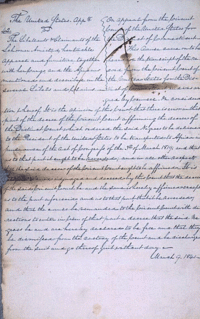This is your morning Open Thread. Pour your favorite beverage and review the past and comment on the future.
Find the past “On This Day in History” here.
March 14 is the 73rd day of the year (74th in leap years) in the Gregorian calendar. There are 292 days remaining until the end of the year.
On this day in 1885, The Mikado a light opera by W.S. Gilbert and Arthur Sullivan, had its first public performance in London.
The Mikado, or, The Town of Titipu is a comic opera in two acts, with music by Arthur Sullivan and libretto by W. S. Gilbert, their ninth of fourteen operatic collaborations. It opened in London, where it ran at the Savoy Theatre for 672 performances, which was the second longest run for any work of musical theatre and one of the longest runs of any theatre piece up to that time. Before the end of 1885, it was estimated that, in Europe and America, at least 150 companies were producing the opera. The Mikado remains the most frequently performed Savoy Opera, and it is especially popular with amateur and school productions. The work has been translated into numerous languages and is one of the most frequently played musical theatre pieces in history.
Setting the opera in Japan, an exotic locale far away from Britain, allowed Gilbert to satirise British politics and institutions more freely by disguising them as Japanese. Gilbert used foreign or fictional locales in several operas, including The Mikado, Princess Ida, The Gondoliers, Utopia, Limited and The Grand Duke, to soften the impact of his pointed satire of British institutions.
The Mikado is a comedy that deals with themes of death and cruelty. This works only because Gilbert treats these themes as trivial, even lighthearted issues. For instance, in Pish-Tush’s song “Our great Mikado, virtuous man”, he sings: “The youth who winked a roving eye/ Or breathed a non-connubial sigh/ Was thereupon condemned to die / He usually objected.” The term for this rhetorical technique is meiosis, a drastic understatement of the situation. Other examples of this are when self-decapitation is described as “an extremely difficult, not to say dangerous, thing to attempt”, and also as merely “awkward”. When a discussion occurs of Nanki-Poo’s life being “cut short in a month”, the tone remains comic and only mock-melancholy. Burial alive is described as “a stuffy death”. Finally, execution by boiling oil or by melted lead is described by the Mikado as a “humorous but lingering” punishment.
Death is treated as a businesslike event in Gilbert’s Topsy-Turvy world. Pooh-Bah calls Ko-Ko, the Lord High Executioner, an “industrious mechanic”. Ko-Ko also treats his bloody office as a profession, saying, “I can’t consent to embark on a professional operation unless I see my way to a successful result.” Of course, joking about death does not originate with The Mikado. The plot conceit that Nanki-Poo may marry Yum-Yum if he agrees to die at the end of the month was used in A Wife for a Month, a 17th century play by John Fletcher. Ko-Ko’s final speech affirms that death has been, throughout the opera, a fiction, a matter of words that can be dispelled with a phrase or two: being dead and being “as good as dead” are equated. In a review of the original production of The Mikado, after praising the show generally, the critic noted that the show’s humour nevertheless depends on
“unsparing exposure of human weaknesses and follies-things grave and even horrible invested with a ridiculous aspect-all the motives prompting our actions traced back to inexhaustible sources of selfishness and cowardice…. Decapitation, disembowelment, immersion in boiling oil or molten lead are the eventualities upon which (the characters’) attention (and that of the audience) is kept fixed with gruesome persistence…. (Gilbert) has unquestionably succeeded in imbuing society with his own quaint, scornful, inverted philosophy; and has thereby established a solid claim to rank amongst the foremost of those latter-day Englishmen who have exercised a distinct psychical influence upon their contemporaries.”

 On this day in 1881.
On this day in 1881.  On this day in 1947,
On this day in 1947,  On this day in 1959,
On this day in 1959,  On 1 March 1959, an unusual invitation to attend a theatrical performance at the Chinese military headquarters outside Lhasa was extended to the Dalai Lama. The Dalai Lama, at the time studying for his
On 1 March 1959, an unusual invitation to attend a theatrical performance at the Chinese military headquarters outside Lhasa was extended to the Dalai Lama. The Dalai Lama, at the time studying for his  On 12 March, protesters appeared in the streets of Lhasa declaring Tibet’s independence. Barricades went up on the streets of Lhasa, and Chinese and Tibetan rebel forces began to fortify positions within and around Lhasa in preparation for conflict. A petition of support for the armed rebels outside the city was taken up, and an appeal for assistance was made to the Indian consul. Chinese and Tibetan troops continued moving into position over the next several days, with Chinese artillery pieces being deployed within range of the Dalai Lama’s summer palace, the Norbulingka. On 15 March, preparations for the Dalai Lama’s evacuation from the city were set in motion, with Tibetan troops being employed to secure an escape route from Lhasa. On 17 March, two artillery shells landed near the Dalai Lama’s palace, triggering his flight into exile. On 19 March the Chinese started to shell the Norbulingka, prompting the full force of the Uprising. According to the freetibet website, on 21 March 800 shells rained down on the palace, including the shelling of the Norbulingka and Lhasa’s major monasteries, slaughtering thousands of Tibetan men, women and children. Combat lasted only about two days, with Tibetan rebel forces being badly outnumbered and poorly armed.
On 12 March, protesters appeared in the streets of Lhasa declaring Tibet’s independence. Barricades went up on the streets of Lhasa, and Chinese and Tibetan rebel forces began to fortify positions within and around Lhasa in preparation for conflict. A petition of support for the armed rebels outside the city was taken up, and an appeal for assistance was made to the Indian consul. Chinese and Tibetan troops continued moving into position over the next several days, with Chinese artillery pieces being deployed within range of the Dalai Lama’s summer palace, the Norbulingka. On 15 March, preparations for the Dalai Lama’s evacuation from the city were set in motion, with Tibetan troops being employed to secure an escape route from Lhasa. On 17 March, two artillery shells landed near the Dalai Lama’s palace, triggering his flight into exile. On 19 March the Chinese started to shell the Norbulingka, prompting the full force of the Uprising. According to the freetibet website, on 21 March 800 shells rained down on the palace, including the shelling of the Norbulingka and Lhasa’s major monasteries, slaughtering thousands of Tibetan men, women and children. Combat lasted only about two days, with Tibetan rebel forces being badly outnumbered and poorly armed. On this day in 1841,
On this day in 1841, 
 On this day in 1911,
On this day in 1911,  Following the
Following the 
 On this day in 1965, a group of 600 civil rights marchers are forcefully broken up in Selma, Alabama. This day would be remembered in the Civil Rights Movement as
On this day in 1965, a group of 600 civil rights marchers are forcefully broken up in Selma, Alabama. This day would be remembered in the Civil Rights Movement as  Bevel’s initial plan was to march to Montgomery to ask Governor
Bevel’s initial plan was to march to Montgomery to ask Governor 


 In this day in 1933, at the height of the Great Depression,
In this day in 1933, at the height of the Great Depression,  On this day in 1887,
On this day in 1887,